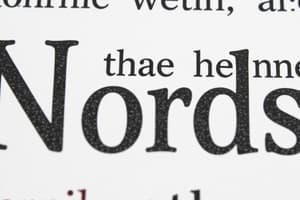Podcast
Questions and Answers
Homophones are words that sound the same and are spelled differently.
Homophones are words that sound the same and are spelled differently.
True (A)
Homonyms are words that have different pronunciations but the same spelling.
Homonyms are words that have different pronunciations but the same spelling.
False (B)
An example of a homograph is 'bow' as in to bend forward and 'bow' as in a weapon for shooting arrows.
An example of a homograph is 'bow' as in to bend forward and 'bow' as in a weapon for shooting arrows.
True (A)
Learning multiple-meaning words can improve reading comprehension.
Learning multiple-meaning words can improve reading comprehension.
The word 'bat' used to describe an animal is an example of a homograph.
The word 'bat' used to describe an animal is an example of a homograph.
The sentence 'Please come here' contains an example of a homonym.
The sentence 'Please come here' contains an example of a homonym.
Homonyms always have different meanings but the same spelling and pronunciation.
Homonyms always have different meanings but the same spelling and pronunciation.
An example of a homophone is 'there' and 'their'.
An example of a homophone is 'there' and 'their'.
A homonym has the same sound and the same spelling but different meanings.
A homonym has the same sound and the same spelling but different meanings.
Homophones are words that look and sound the same with different meanings.
Homophones are words that look and sound the same with different meanings.
The word 'lead' can be both a homograph and a homonym.
The word 'lead' can be both a homograph and a homonym.
Homographs are words that sound the same but are spelled differently.
Homographs are words that sound the same but are spelled differently.
The word 'bow' can serve as both a homograph and a homonym.
The word 'bow' can serve as both a homograph and a homonym.
The use of homophones can lead to miscommunication.
The use of homophones can lead to miscommunication.
The pair 'fair-fair' is an example of a homophone.
The pair 'fair-fair' is an example of a homophone.
The words 'sea' and 'see' are homographs.
The words 'sea' and 'see' are homographs.
Flashcards
Multiple-Meaning Words
Multiple-Meaning Words
Words with the same spelling or sound, but different meanings.
Homophone
Homophone
Same pronunciation, different spelling, different meanings.
Homonym
Homonym
Same spelling and pronunciation, different meanings.
Homograph
Homograph
Signup and view all the flashcards
Box (verb)
Box (verb)
Signup and view all the flashcards
Box (noun)
Box (noun)
Signup and view all the flashcards
Jam (noun)
Jam (noun)
Signup and view all the flashcards
Jam (verb)
Jam (verb)
Signup and view all the flashcards
Use of 'fly' (noun)
Use of 'fly' (noun)
Signup and view all the flashcards
Use of 'leave' (verb)
Use of 'leave' (verb)
Signup and view all the flashcards
Examples of Homophones
Examples of Homophones
Signup and view all the flashcards
Examples of Homonyms
Examples of Homonyms
Signup and view all the flashcards
Examples of Homographs
Examples of Homographs
Signup and view all the flashcards
Study Notes
Multiple-Meaning Words
- Multiple-meaning words have the same spelling or sound, but have different meanings.
- Examples include: "dog bark" and "tree bark", "bus fare" and "county fair".
- Word meanings can change based on how they are used in a sentence.
- For example, "present" can mean a gift or to show something.
Types of Multiple-Meaning Words
- Homophones: Same sound, different spelling, and different meanings. Examples: "here" and "hear", "deer" and "dear".
- Homonyms: Same sound, same spelling, and different meanings. Examples: "bat" (animal) and "bat" (baseball), "fly" (insect) and "fly" (to travel)
- Homographs: Different sound, same spelling, and different meanings. Examples: "bow" (weapon) and "bow" (to bend your head), "lead" (metal) and "lead" (to guide).
Importance of Learning Multiple-Meaning Words
- Enlarges vocabulary.
- Reduces miscommunication.
- Improves reading comprehension.
Studying That Suits You
Use AI to generate personalized quizzes and flashcards to suit your learning preferences.
Related Documents
Description
Explore the fascinating world of multiple-meaning words in this quiz. Learn about homophones, homonyms, and homographs through examples and definitions. Understanding these concepts will enhance your vocabulary and improve your reading comprehension.




